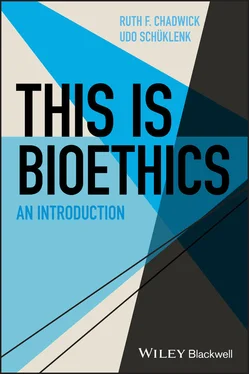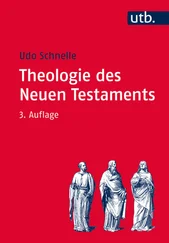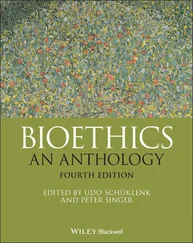1.4 Be mindful that even if we agreed with the content of the Hippocratic Oath or a modern version of it, and even if they actually provided us with guidance for the problem under consideration, we would again have to take it on authority that we should go about the NGO’s problem in one particular way and not in another, unless there is an ethical justification provided why we should do what it admonishes us to do. Given that in our scenario almost certainly a lot of people would disagree with whatever it is that is being proposed, policy wise, it is important that we get our justification right. Here is where ethics’ second purpose comes in: In addition to providing us with action guidance, it must also provide us with a reasoned justification for the guidance given .
1.5 As we will discover, there exist a fair amount of competing ethical theories, some more influential than others, that succeed with varying degrees of success both on the action guidance as well as on the action justification fronts. How should we decide then, which one, or which set of them to adopt for our own purposes? Is it ok to use one set of theories for one type of problem and another set of theories for another type of problem? Couldn’t we choose virtue ethics for decision‐making at the hospital bedside, but decide to go with utilitarianism for matters of resource allocation decision‐making? But why should we do that, as opposed to just the opposite? Could there be a meta‐theory telling us which theoretical approach to deploy under what circumstances? Or must we determine which theory is the right one and try to abide by its guidance as best as we can, even if some of that guidance is turning out to be deeply counter‐intuitive? Well, these are questions about the nature of ethics; they ask whether there can be a true ethics, whether ethical statements must be of a particular kind, whether they can be objectively true or false, or whether they ultimately boil down to statements expressing our feelings. These and other questions are typically analyzed by meta‐ethicists. They don’t create ethical theories, rather they create theories about ethics. There are also legitimate questions about the extent to which ethical theories truly lend themselves to be ‘applied’ in some sense or another to problems such as the one mentioned at the beginning of this chapter. We will not engage in this sort of theorizing about ethics in this chapter, with the exception of a few paragraphs on ethical relativism. The reason for this is that the discussions driving meta‐ethics are quite technical in nature, and by and large there is no obviously correct solution to many of its controversies. Even in the absence of final answers to many of these questions, however, it is still quite possible to undertake ethical analyses. As we will see throughout this book, some arguments are more plausible than others; certain types of argument, such as for instance slippery‐slope based arguments, are almost always flawed, and so on and so forth. However, you can easily read up on meta‐ethical theories elsewhere. (McMillan 2018) A wonderful source of superb on‐line Open Access content, written usually by the some of the best philosophers around, is the Stanford Encyclopedia of Philosophy . Check, for instance its entry on Theory and Bioethics 10 ( or Singer 1991, Part VI: The Nature of Ethics).
1.6 Bioethics is specifically concerned with normative issues in the biomedical and life sciences. Bioethicists hail these days from many different disciplines, including theology, law, medicine, sociology and many others. Think of typical problems bioethicists analyze in their research: Should we permit editing of the human genome? Is it acceptable to use sentient animals in clinical research? Is abortion wrong? Should we decriminalize assisted dying in some form or shape?
1.7 Theologians will be able to tell us what a respective religion would make of the problem at hand. Legal experts could tell us what the law currently says with regard to any of these issues; they might even bravely venture into an analysis suggesting that the law ought to be changed, if they find it to be a violation of their country’s constitutional values. Health care professionals should be able to enlighten us with regard to what their professional values have to contribute to these difficult questions. Sociologists do what sociologists do best, they will ask other people, say taxi drivers, philosophy students, or a representative sample of a given group of people, what their take is on these questions. None of these discipline‐specific responses is capable of enlightening us in a moral or ethical sense. The problems flagged earlier can all be read as asking fundamental ethical questions, namely: Is it ethical to alter the human genome? Is it moral to use sentient animals for clinical research purposes? Is abortion immoral? Is the criminalization of assisted dying ethically defensible? Bioethics relies first and foremost on ethics to sustain reasonable defensible answers to these questions. However, it is not the type of ethics that many armchair philosophers would recognize as traditional philosophical ethics. There can be no doubt that bioethical reasoning is not as deep or watertight as, for instance, meta‐ethical reasoning aims to be. Rather, with few notable exceptions, it aims to use the normative frameworks, that we will be looking at, as a rough guide indicative of where, say a utilitarian analysis would lead us when we consider the morality of abortion and infanticide. These frameworks are also useful as tools of critical analysis. They offer us some pretty good guidance and guidance justification on the types of criteria that we might apply when we go about asking, for instance whether abortion is a morally good or bad thing. They could even help us taking a considered ethical stance on markers of fetal development that are frequently argued over by activists and legislators alike. Say, does the moment of conception confer moral standing on the developing human? Or, does the capacity to feel anything matter? Does it matter whether an embryo would be capable of surviving outside the pregnant woman’s womb? These are the types of questions that ethical theories can indeed shed new light on.
1.8 Before we try to get a quick overview of major ethical theories that exert today a significant influence in bioethics, let us briefly address a few other preliminary issues, namely, that of the place of religion in ethics, the relationship between the law and ethics, the challenge ethical relativism poses particularly in the context of bioethics, and the not completely irrelevant question of why we should bother being ethical to begin with.
1.9 In the 1850s, the American Medical Association (AMA) was busy developing the content of its Code of Medical Ethics. At the time James L. Phelps, an influential Christian doctor in New York, tried to insert in this code a professional obligation for doctors to preach the truth of the Christian gospel. He referred to ‘the paramount duty of the profession to their patients not only as regards their body in disease, but also the higher interests of the immortal soul. And hence, also the just claim of religion, the great anaesthetics of the immortal mind, to be considered an element of medicine or the healing art’ (Baker, 2013, 181).
1.10 His fellow doctors at the AMA rejected his approach. They aimed instead for a secular code of medical ethics, and also a secular interpretation of professionalism for its members. Their reasons were entirely pragmatic, as you will notice when you read their rationale: ‘the principles promulgated by this code have been assumed as a common ground upon which every member of the Association may stand, without reference to the distinctive principles or doctrines which distinguish the various religious societies existing among the vastly extended and diversified population of our country’ (Baker, 2013, 181).
Читать дальше












